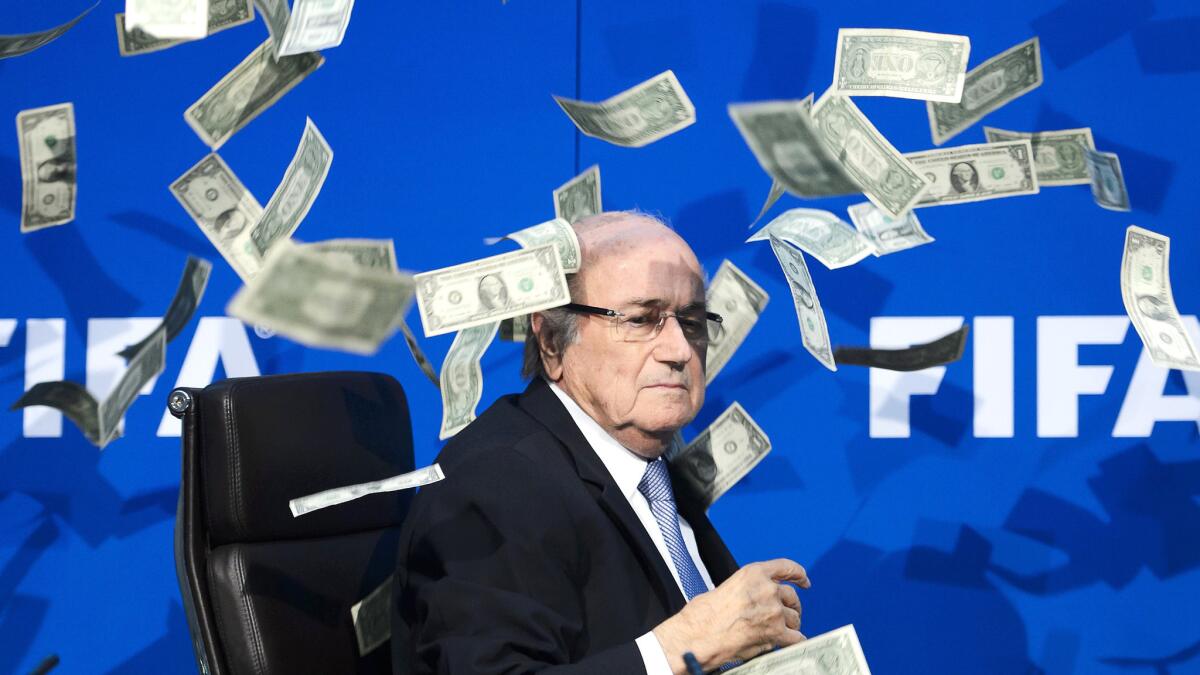FIFA scandal makes rebuilding and redemption unlikely, but it might try

FIFA President Sepp Blatter reacts after a British comedian interrupted a news conference in Zurich on July 20 by throwing fake dollar bills.
The Swiss attorney general’s decision to open a criminal investigation against FIFA President Sepp Blatter leaves little doubt the end days have arrived for Blatter’s 17-year reign atop soccer’s world governing body.
Less certain is whether FIFA itself will fall as well.
The Swiss case, which involves criminal mismanagement and misappropriation of funds, is the latest in a four-month series of legal body blows against the organization.
In May, the U.S. Justice Department handed down indictments against nine high-ranking soccer officials and five sports marketers, who were charged with racketeering, money laundering and bribery, among other offenses. This month, Jerome Valcke, FIFA’s secretary general and Blatter’s top aide, was suspended following allegations he was involved in a plan to resell 2014 World Cup tickets at a substantial mark-up.
Now come the allegations against Blatter who, like Valcke, denies any wrongdoing.
And more charges are coming, say U.S. Atty. Gen. Loretta Lynch and her Swiss counterpart Michael Lauber, whose office has examined more than 11 terabytes of evidence, including 121 Swiss bank accounts. Luxury apartments in the Swiss Alps belonging to high-ranking FIFA officials also were seized.
As those dominoes continue to topple, FIFA’s shaky foundation continues to crumble, with the level of rot leaving the rebuilding — much less the redemption — of the organization unlikely.
Which doesn’t mean it won’t try.
“Never bet against FIFA’s ability to persist in poor governance,” Roger Pielke Jr., a University of Colorado professor and political scientist who tracks FIFA, wrote in an email from Australia, where he was lecturing.
“It has proved remarkably resistant to meaningful change. What it should do to improve its governance is fairly clear. Doing it has been the problem. FIFA could simply install a new president, make some cosmetic changes and sail on. That seems more likely than wholesale reform.”
But that may not work this time, said Jonathan Calvert, a British journalist who conducted his own investigation of FIFA while researching “The Ugly Game: The Corruption of FIFA and the Qatari Plot to Buy the World Cup,” a book he co-wrote with Heidi Blake.
“It probably is the case that you’ve got to tear the whole thing down,” Calvert said by phone from Switzerland.
“The whole FIFA reform is a joke. At the moment they are incapable of reforming themselves.”
True change can’t happen, he said, until FIFA revokes its one-nation, one-vote policy, which gives all 209 member countries — from tiny Vanuatu, with a population about the size of Santa Clarita, to massive China — the same power.
“Until they sort that out, they’re going to continue to have problems,” Calvert said. “They’ll continue to have inappropriate presidents who use FIFA’s television money to reward tiny nations who desperately need the money … in order to secure power.”
That’s exactly what is alleged to have occurred this time. Swiss authorities say Blatter assigned television rights for the 2010 and 2014 World Cups to the control of FIFA official Jack Warner, now under indictment, for $600,000 in exchange for Warner’s support in Blatter’s bid for reelection as president.
Warner then licensed those rights and sold them for $20 million; Blatter stayed on as president.
And now the widening scandal is affecting things on the field. Next summer’s Copa America Centenario was scheduled to be played in the U.S., but last spring’s U.S. indictments allege more than $110 million in bribes had been paid to North and South America soccer officials in exchange for lucrative sponsorship and media rights to the event.
That led U.S. Soccer, which has not be implicated in any of the wrongdoing, to keep the tournament at more than an arm’s length despite the fact it would serve as an important test for both the U.S. national team and U.S. Soccer, which had hoped to prove its organizational prowess ahead of an expected bid for the 2026 World Cup.
Still, talks to keep the Copa in the U.S. continue. An official with CONCACAF, the governing body for soccer in North and Central America and the Caribbean, which would jointly stage the tournament with the South American federation, said the groups are working under a very aggressive timeline and were hopeful a deal could be reached in the next month.
Said the official, who was unable to speak about the negotiations on the record: “This has by no means been a normal process.”
Nor has been the implosion of FIFA, which Calvert says could take the World Cup down the drain with it.
“Who knows,” he said. “There might, in the end, be a sort of split-off competition in which the Europeans, the Americans, the Australians, South Americans all get together and say ‘FIFA’s not fit its purpose. We’ll have our own World Cup and the other countries can join us.’ ”
Twitter: @kbaxter11
MORE ON FIFA CORRUPTION SCANDAL
What the criminal investigation of Sepp Blatter means for FIFA
Swiss open criminal investigation against FIFA President Sepp Blatter
With Sepp Blatter an investigation target, FIFA faces defining decisions







